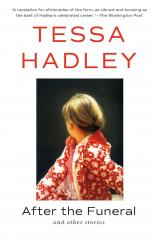After the Funeral and Other Stories
Review
After the Funeral and Other Stories
Any writer who produces short stories with regularity has to reckon with the reality that even their best work won’t attract a large audience. Fortunately, that hasn’t yet deterred Britain’s Tessa Hadley. AFTER THE FUNERAL AND OTHER STORIES, her fourth collection, is noteworthy for its psychological acuity and the economy of its prose. Readers who aren’t familiar with her previous work will be happy for this fresh opportunity to discover how talented she is.
Hadley generally works on a small canvas, as each of the 12 stories in this volume, seven of which have been published in The New Yorker, is contained in both its setting and its time span. She focuses almost exclusively on female characters from her native land, most of whom are well-educated and intensely self-aware (and often subtly dissatisfied with their lives), and all of whom seem comfortably situated in what would be considered the middle class. But with the subtle calibrations that another great short story writer, George Saunders, describes in A SWIM IN A POND IN THE RAIN, Hadley manages to avoid the risk of sameness as one tale flows effortlessly into the next.
"Tessa Hadley’s stories are compact, elegant, and travel to the heart of what it means to navigate a world where our desires sometimes are at odds with those of others who are close to us."
The title story, which opens the collection, is one of its more complex and emotionally charged. Marlene suddenly finds herself widowed and alone with two young daughters when her husband, an airline pilot, dies of a heart attack in a Paris hotel room, perhaps in the company of a woman. In order to arrest her family’s slide down the economic ladder after discovering he died with no life insurance and only a small pension, she takes a job as a receptionist for a Dr. Cherry, one of the mostly unappealing male characters who appear in these stories. That decision launches the characters on a path of sexual intrigue that Hadley reveals with wicked cleverness.
Hadley’s prose doesn’t call particular attention to itself, but she’s the sort of writer whose well-crafted sentences like this one invite rereading: “Sadness made its claim on them now, winding through all the daily clutter like a cool long note played on a flute.” She often deploys those sentences in aid of swift and efficient character description.
That’s true of Gil, a boorish history professor in “Funny Little Snake,” who “kept one step ahead of any fixed position, so that no one could catch him out in it” and fobs off to his second wife the responsibility of returning his daughter from his first marriage to his ex-wife after a visit. In the collection’s concluding story, “Coda,” the narrator observes of her mother that “the compass in her nature was set to cheerfulness,” while of herself she points out that “the story of my life was set down, its themes were established, and I was living in the coda.”
Even stories like “Cecilia Awakened” and “Mia,” which essentially are extended character sketches, are enjoyable on those terms. In the former, the title character recalls a holiday she spent with her parents in Florence. Before that time, “the odd child she was had seemed to fit in perfectly with the oddity of her rather elderly parents” --- her father was a university librarian, and her mother was an author of historical novels. But on this trip, when she “woke up inside the wrong skin,” she declares her independence with a gesture that represents “not a sexual awakening, or not exactly --- rather an intellectual or imaginative one.”
Alison, the protagonist of “Mia,” is doing well in secondary school but “wanted to be beautiful.” In her mind, that translates into a “more or less clear ideal of beauty: hollow-eyed and scowling, dark and disabused and thin.” When she turns her cooking skills into a job preparing in-home meals, she comes face to face with the misery of the eponymous client --- “glamorous, fatal, unattainable” --- and has her eyes opened to the folly of her longing.
But in their essence, Hadley’s profoundly realistic stories are about the difficulties of our relationships --- whether they’re between former spouses who encounter each other by accident rushing to the Underground (“Dido’s Lament”), sisters who have come together to await the impending death of their mother (“The Bunty Club”), or a woman who sees her younger sibling for the first time in 15 years in the company of some questionable men at the hotel where she works (“Men”). When death intervenes, as it does several times, in such stories as “Old Friends” and “The Other One,” it’s more a source of complication than closure.
Tessa Hadley’s stories are compact, elegant, and travel to the heart of what it means to navigate a world where our desires sometimes are at odds with those of others who are close to us. One couldn’t ask for a better guide through that territory. If you’ve never experienced the pleasures of reading her, a simple question suggests itself: What are you waiting for?
Reviewed by Harvey Freedenberg on July 22, 2023
After the Funeral and Other Stories
- Publication Date: July 2, 2024
- Genres: Fiction, Short Stories
- Paperback: 240 pages
- Publisher: Vintage
- ISBN-10: 0593469844
- ISBN-13: 9780593469842




